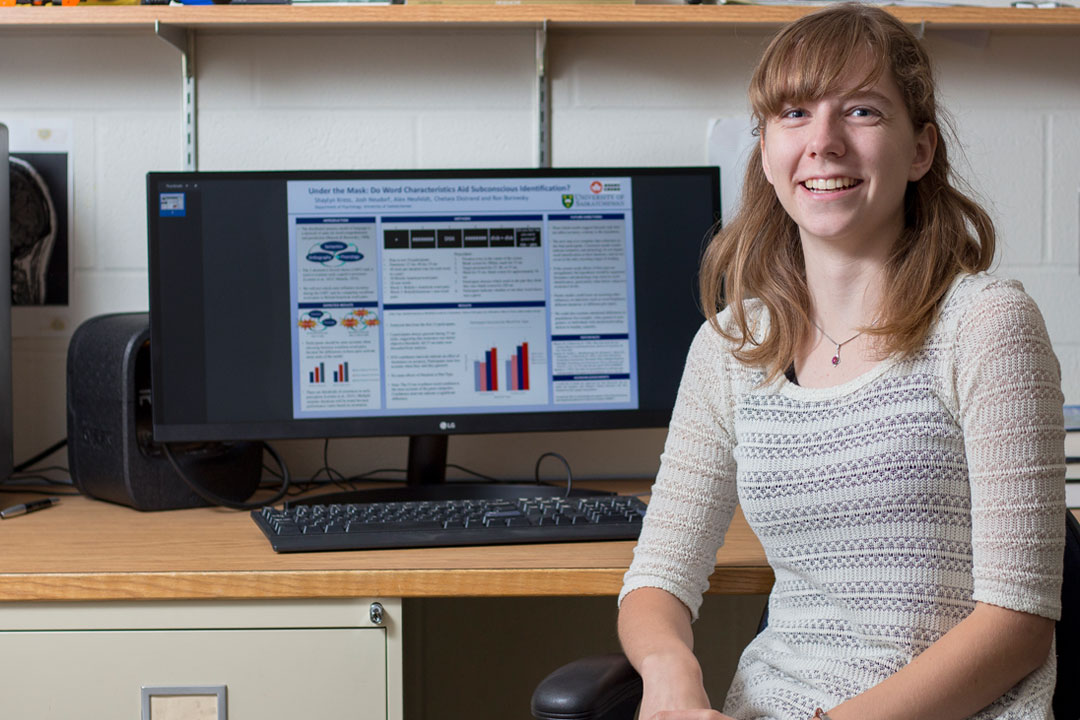
Undergraduate research assistant prepares for poster competition
Shaylyn Kress is looking at language as part of her work in the Cognitive Neuroscience Lab at the University of Saskatchewan.
By Shannon BoklaschukIn particular, the fourth-year undergraduate student is “investigating how different word characteristics can help participants identify briefly presented words or non-words.”
“My current study is comparing British (and) American spelling variants—such as disc and disk—with non-words—disb—to test whether characteristics like word meaning and pronunciation help participants accurately choose which word they saw, even when guessing,” said Kress, who is pursuing a Bachelor of Science (Honours) degree in psychology, with a minor in computer science, in the College of Arts and Science.
“The hypothesis is that because the non-words differ on spelling, meaning and pronunciation from their corresponding real word, the participants will be more accurate at their identification. This research will help pinpoint how early language processes work, and will lead into future studies that investigate the relation between early visual attention and reading,” she said.
Kress is among the dozens of undergraduate student research assistants hired to work alongside U of S faculty members this summer. Mentored by Professor Ron Borowsky, Kress works with other graduate and undergraduate students in the Cognitive Neuroscience Lab and describes the opportunity as “an awesome experience.”
“In general, the lab’s research focuses on understanding the various mechanisms behind different cognitive processes, such as attention, emotion and reading. We also look at how these different processes can help or hinder each other when they interact,” said Kress.
“A typical day will have me reading research papers related to my project or lab interests, discussing study ideas with the other lab members or running analysis on recently collected data. I also will recruit and run participants through our current experiments. Everything in the lab is a collaborative effort, so each day has something different and I am always learning about new theories and ideas.”
On Aug. 17, Kress will have the opportunity to share her research with fellow undergraduate students and the wider university community. She will be a participant in the annual Undergraduate Student Research Assistantship (USRA) Summer Social and Poster Competition, to be held in the Agriculture Atrium and second-floor walkway from 9 a.m. to 4 p.m.
Co-hosted by the Office of the Vice-President Research (OVPR), Strategic Initiatives Unit, and the College of Graduate and Postdoctoral Studies, the event showcases and celebrates accomplishments in undergraduate research across multiple disciplines. In total, 69 poster projects will be on display. Students will have five to 10 minutes to present their projects to judges and $600 will be available in cash prizes: $300 for the top project, $200 for second place and $100 for third place.
“I wanted to participate in the poster competition because it is an excellent opportunity to practice my presentation skills and share my project with other researchers at the university,” said Kress.
“I think it is important for undergraduate students to participate in research activities such as this poster session because the learning opportunities are just so valuable. The information you read in textbooks and articles becomes much more meaningful when you actually have the chance to take part in the experiment process and apply the knowledge to your own research questions,” she added.
The USRA Summer Social and Poster Competition has been held annually at the U of S since 2014 for the dozens of research assistants hired each summer to work with faculty across all disciplines, said Kara Loy, coordinator, Undergraduate Research Initiative, Strategic Research Initiatives, OVPR.
“Our undergraduates have stories of humour, overcoming challenges and generating exciting insights in research, scholarly and artistic works,” said Loy.
“When students, supported by faculty mentorship and connections to the broader community, contribute to our university mission of discovery, we see how we may tackle our trickiest questions and make the world a better place.”
The Natural Sciences and Engineering Research Council (NSERC) provided funding for Kress’ USRA award, as well as for the Discovery Grant that funds the research in Borowsky’s lab.

